Bee Against Poverty Zambia
Our aim is to help local people take the first steps out of poverty themselves!
About Us

How did 'Bee Against Poverty Zambia' start?
It started when God laid these words "BEES FOR ZAMBIA" on my heart, the morning after I had attended a Christian conference in Bournemouth, where I had asked God to use me more for his purposes.
The word "BEES" wasn't strange to me as I am a beekeeper, but the words "FOR ZAMBIA" that was exciting and worrying at the same time. After praying about this I knew I had to go and see two good friends of mine who were already involved with two orphanages and a project called 'Streetlife' in Kitwe Zambia.
When I told Phil and Sonia what God had laid on my heart, it soon became apparent that God had already placed the same thing on Phil's heart, but the year before.
From that meeting with Phil and Sonia 'Bee Against Poverty Zambia' was born!
It was then that Phil and I, two UK Beekeepers inspired by God to use our skills as Beekeepers to help those in poverty in Zambia, began to make plans for the project. The first thing we did was to get in touch with 'Dayspring Ministries' who run the two orphanages and the 'Streetlife' project in Kitwe Zambia.
To our amazement Apostle Dr Joseph Mwila, who runs Dayspring Ministries with his wife Lillian, told us that he had recently been asked by a number of people why the church was not getting involved in beekeeping to help people out of poverty. Joseph told them that they had no one who knew anything about beekeeping within the church. That of course was until Phil and I told Joseph what God had laid on our hearts. Joseph thanked God for His provision and was very excited about the project. Since then we have been in contact with 'Dayspring Ministries' and Joseph, arranging our visit to setup bee hives and to decorate and equip a honey processing room in the girls orphanage.
What is ‘Bee Against Poverty Zambia’ all about?
Bee Against Poverty Zambia is not a charity, and as you have already read it was started by two UK Beekeepers who were inspired by God to do so. We believe that ‘Bee Against Poverty Zambia’ with Gods help, can help local people in and around Kitwe Zambia to take the first steps themselves out of poverty.
How? Well, by providing a honeycomb processing room in the girls orphanage, which will be run by the girls and produce honey and wax candles that they can sell to local retailers. This we hope will then bring in a small sustainable income for Dayspring Ministries who run the orphanages and the Streetlife project.
The problem we face now is that individual people can not have aa hive next to their homes as we can here in this country. This is because the African bees are much more aggressive than our European bees. Also there isn't the space between most of the homes and gardens that we are use to here.
Another way might be to pay farmers or villages to look after Beehives that belong to ‘Dayspring Ministries’ and then the honeycomb from these Beehives can be collected and processed into honey by ‘Dayspring Ministries’. This way Farmers or whole villages will be able to earn themselves an income from looking after the Beehives, paid to them by ‘Dayspring Ministries’.
It also helps the environment, because if farmers are earning enough income from looking after the Beehives they won’t need to destroy trees to make charcoal. Unfortunately we are still in the process of working out the details of how this might work helping local farmers and people in and around Kitwe who are in poverty to take the first steps out of poverty.
But ‘Bee Against Poverty Zambia’ with God's help, has come up with a starter plan for the project which will be funded from donations receive from various events and individual donations.
Bee Against Poverty Zambia is a work in progress, we have already been able to send bee equipment ready to set up a honey processing room in the girl's orphanage. Also we have sent protective bee suits and beekeeping equipment for a Beekeeper to look after the hives that we intend to setup on 'Dayspring Ministries' farmland.
We are now scheduled to go out to Kitwe Zambia next year, so that we can help to setup and to buy any remaining materials or equipment needed for the project.
Our aim is:
To supply 'Dayspring Ministries' with:
* 4 Top Bar Beehives with beekeeping equipment.
* Train a Beekeeper to look after the 4 Hives.
* Setup a honey processing room.
* Train someone to run the Honey processing room.
* Put more Top Bar Beehives on the farmland
Then we want to:
Help Local people in and around Kitwe by:
* Possibly supplying and setting up Top Bar Beehives on land owned by farmers or groups of villagers, who are then paid to look after the hives and get a percentage of the money made from the honeycomb after it has been processed into honey and sold.
* Enable already established beekeepers in the area to sell their honeycomb to ‘Dayspring Ministries’ for a fair price
* Helping 'Dayspring Ministries' to produce an income that is self-sufficient and sustainable through beekeeping.
What has happened so far?
Through various organised events people have been very generous and donated enough money and second-hand bee equipment, so that we have been able to set in motion what we want to achieve for 'Dayspring Ministries'. Which is to decorate and equip a honey processing room in the girls orphanage and to buy 4 protective Bee suits and gloves and smokers, plus 4 Top Bar Bee hives.
After buying the honey processing equipment and bee suits (not the top bar bee hives) we were able to safely ship it all to 'Dayspring Ministries' in Kitwe Zambia. This was with the intentions of it being there ready for us to setup, when we arrived in June 2018.
Unfortunately because of unforeseen circumstances our visit didn't take place, and it was rearranged to take place in February/March 2019, but our flight tickets, which were promised by the agent we could use in 2019 didn't materialize. Then covid hit and we were unable to travel until this year. So, now we have had to start from scratch again raising the necessary funds for our flights so that we can finally get to Kitwe and setup the project in May of next year, God willing we will get there this time.
What happens now?
We are still raising funds so that we can continue to pay for the following Bee equipment and other things needed for us to achieve our project goals for 'Dayspring Ministries' and for the local people (farmers & villagers in and around Kitwe Zambia.
Such as:
- Need to decorate the honey processing room (before we visit)
- Boys from the orphanage to setup the 4 Top Bar Bee hives on the farmland (before we visit )
- Provision of jars, account books and work jackets (before we visit)
- Getting all the legal documentation and certificates needed for the honey processing room to be completed (before we visit)
As you can see there are a number of objectives that we are trying to complete from the UK in Kitwe before we visit. However, this is proving a little difficult at the moment, but we are sure we will get there eventually with God's help.
Below are a few photos to show what type of Bee equipment we have already bought or had donated for the project and other things we still need for the 'Bee Against Poverty Zambia' project.
A list of Bee equipment bought for the project and items still needed; a red dot indicates items still needed for 'Dayspring Ministries'
Top Bar Bee Hives, Queen excluders, Protective Jackets with Veils, Protective Trousers, Protective Gloves, Smokers & Beekeeping Training

A list of Bee equipment bought for the Honey Processing Room; a red dot indicates items still needed
Decorating materials, Honey Press, Weighing Scales, Stainless Steel Strainers, Storage buckets, Settling bucket, Label maker, Ladle, Muslin cloth, Account books, Work Jackets, Plastic honey jars & a one off start-up fund.

Thank you for taking the time to read about 'Bee Against Poverty Zambia'.
The need to help people in Zambia help themselves to get out of poverty is real.
Two thirds of the population in Zambia are living in poverty, despite some big countries investing and building roads and schools etc in Zambia. With our current project plan we have and with Gods help, we want to start helping those local people in and around Kitwe, to help themselves out of poverty.
So, the question is, do you think this is something you can help us achieve?
If you would like to help 'Bee Against Poverty Zambia' project, you can do so by making a donation or by getting involved yourself in the project, for either of these, please contact us via our email at: beeagainstpovertyzambia@gmail.com.
Many thanks & God bless
Dave & Phil
'Bee Against Poverty Zambia'
Information

INFORMATION
Bee Against Poverty Zambia is based in Hampshire, England and in the Copperbelt Region, Kitwe, Zambia
If you want to get in touch with us for any of the following reasons:
- To make a donation to Bee Against Poverty Zambia
- To personally get involved in the Bee Against Poverty Zambia project
- To get more information about Bee Against Poverty Zambia
Please use the Contact Us page
DAYSPRING MINISTRIES is based in Kitwe, the Copperbelt Region, Zambia
If you want to get in touch with Dayspring ministries for any of the following reasons:
- If you wish to make a donation to help fund the work of 'Dayspring Ministries' such as the Streetlife project and the two Orphanages
- If you wish to sponsor a child in one of the 'Dayspring Ministries' orphanages
- If you have any questions or want more information about 'Dayspring Ministries'
Please contact: info@christcentralchurches.org
INFORMATION
Why choose a TOP BAR Bee hive?
 Top Bar Hive on legs Bars span across the hive Bars with stater strips of wax in Bars with Honey comb on (we will suspend it from wires)
Top Bar Hive on legs Bars span across the hive Bars with stater strips of wax in Bars with Honey comb on (we will suspend it from wires)
In Zambia and other African Countries the traditional method for attracting and keeping Bees is to split a log in two then hollow out both parts, using one half as the base and the other as the lid or roof. A small opening is made in the log for the Bees to enter, then it is coated inside with a mixture of wax and propolis to attract a swarm, the log is then suspend in a tree. When its time to harvest the honey someone goes up the tree takes off the lid or roof and smokes the Bees, so they can cut away the honey comb which may or may not have brood in it.
The reason there may be brood in the honeycomb is because the queen can roam wherever she wants to in the log over the honeycomb laying her eggs in cells on the honeycomb. The honeycomb that has been cut away is then usually pressed or squeezed to extract the honey out of it.
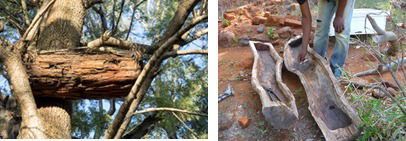
A lot of people now generally use a Top Bar hive in Zambia and Africa, which is similar to the traditional log hive and it too can be suspended in a tree, but it can also be suspended on wires or put on legs.
Another hive that is used is the Langstroth hive, but this type of hive along with the National hives all need wooden frames with wax foundation in them for the Bees to build the honeycomb on and produce honey. This means that a Beekeeper has to have a good supply of wooden frames and wax foundation. This is because the wax foundation in the wooden frames will need renewing from time to time, as will the wooden frames themselves.
See the images below for an example of a sheet of wax foundation and a wooded frame + a honeycomb frame full of honey.

To extract the honey from a Langstroth or national hive you usually uncap the honey on the wooden frames and then spin the honey out of the frames. But if the frames haven't any wires in the wax foundation the honeycomb can be cut out of the frames and then pressed to extract the honey.
The brood in a Langstroth or National hive can't be seen to check them out unless you take off the super box which is where the Bees are storing the honey. This means that the Bees can get stressed and disrupted from their task of building honeycomb and producing honey for the duration of the brood inspection. However, in a Top Bar hive the brood can be checked out by removing a bar one at a time and so this reduces the stress and disruption to the Bees.
With a Top Bar hive the Bees build their honeycombs downwards from a small starter strip of wax attached to a bar that spans across the body of the hive at the top. When it is time to harvest the honey, bars are removed one at a time and the honeycomb can be cut away from the bar without much effort, then the honeycomb is pressed to extract the honey.
But like the Traditional Log hive the honeycomb can have brood in it, so care must be taken when cutting the honeycomb away, so as not to destroy the brood which is the next generation of worker bees etc.
We will be suspending the Top Bar Hives from wires attached to a wooden bar and two upright posts like the goal posts and bar in a football net, this is to help protect the colony from termite attack.
To try and stop the Queen from roaming around the hive you could try introducing a Queen Excluder around bars 8 or 9 in a 21 bar hive and around bars 10 or 11 in a 25 bar hive. This will then prevent the Queen from being able to lay her eggs on any of the other bars that have honeycomb attached to them.
After trying this on a top bar hive for a season we found it didn't work very well as none of the bees liked the Queen excluder and they didn't go past it themselves very much, so there was no honeycomb built passed the Queen excluder, we will have to rethink this.
In a Langstroth or National hive a Queen Excluder is introduced between the brood box and the super box to control the movements of the Queen and where she lays her eggs.
But I have found myself that leaving out the Queen excluder altogether allows the worker Bees more freedom to build and fill the honeycomb. Then nearer the time of harvesting the honey, sometimes the Queen will only lay her eggs on the first few bars of honeycomb near the hive entrance. This makes it easier to extract the honeycomb without destroying or damaging the brood because they don't appear in the bars of honeycomb further on down in the hive.
See the image below for an example of a Queen Excluder. Because of the Queens shape and size and long legs she can not get through the gaps in the Queen Excluder, but the worker Bees can.
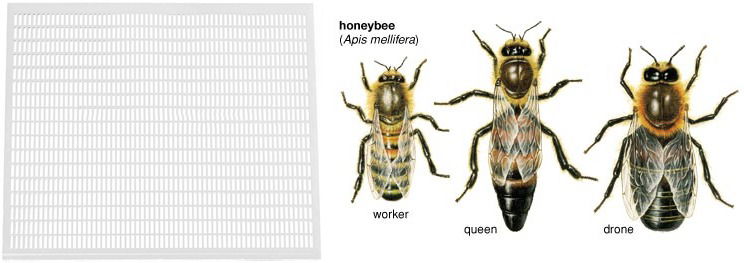
The other thing with a Top Bar hive is the fact that you can use a Separator to block off a number of bars so that the Bees can't get to them. The reason for doing this may be because the colony is not a strong one and so as it grows you can allow more bars to be used by the Bees to attach honeycomb to.
To make a Top Bar hive in Zambia, many are made from scrap pieces of wood that have been collected and glued together to make the sides, ends, floor and roof of the hive. This makes the hive cheap to make, but unfortunately even though this makes the hives cheap, most people in Zambia still wouldn't be able to afford to buy one, as 2/3 of the people in Zambia are in poverty.
This is where 'Bee Against Poverty Zambia' comes in!
Zambia Info

This landlocked country has experienced rapid economic growth over the last decade, as Africa's second largest copper producer after the Democratic Republic of Congo. But its over-reliance on copper has made it vulnerable to falling commodity prices.
Zambia also has one of the world's fastest growing populations, with the United Nations estimating that the Zambian population of 13 million will triple by 2050.
In Zambia ¾ of the population are still in poverty, this is despite economic growth and massive Chinese investment in Zambia. Chinese investment like creating roads and building schools etc, but their investment is connected with their rights to mine and export minerals from Zambia such as copper. Unfortunately, their investment doesn’t impact on the poverty in Zambia and therefore doesn’t help the majority of Zambian people. (A quote from the BBC profile of Zambia 6th July 2017)
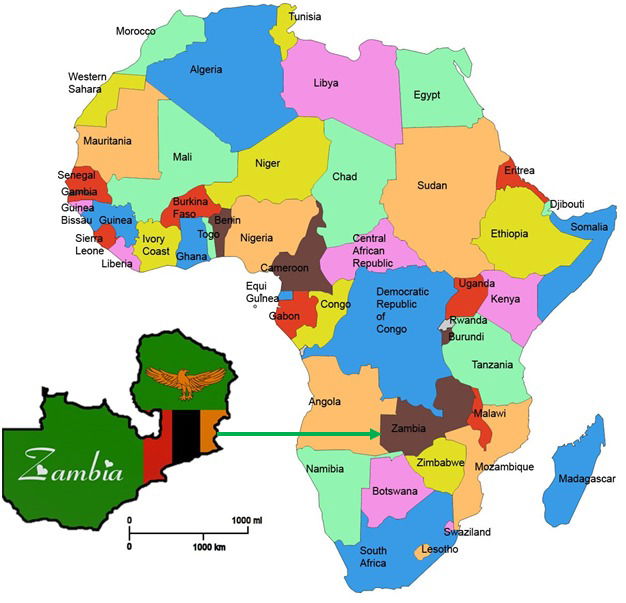
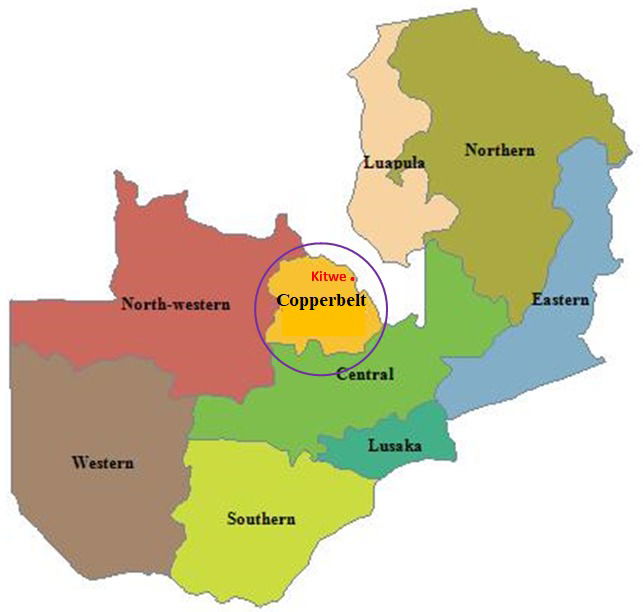
The Copperbelt Region
The Copperbelt Province is where the town of Kitwe is situated, it is the second largest town in Zambia, with a population of approximately 401,000 people. The Copperbelt area as it sounds is a mining area and copper and other minerals are mined and then exported for the most part by China to China.
Zambia Population 2022 is approximately 19,634,697
Zambia, officially the Republic of Zambia, is a landlocked country in Southern Africa bordered by Tanzania, Malawi, Mozambique, Zimbabwe, Botswana, Namibia, the Democratic Republic of the Congo, and Angola. The estimated 2017 population of Zambia is 17.09 million, which ranks 70th in the world.
Zambia's estimated population is 19.06 million, while it is the 30th largest country, Zambia is not densely populated with just 17 people per square kilometre (44/square miles), which ranks 191st in the world.
The capital and largest city is Lusaka, with a population estimated at 3 million in 2022. Much of Zambia's population is concentrated around Lusaka in the south and the Copperbelt Province in the northwest. Zambia is one of the most urbanized countries in sub-Saharan Africa with 44% of the population in a few urban areas while rural areas remain sparsely populated.
The most widely spoken language in Zambia is Bantu of the Bemba people but English is the preferred second language.
HIV & Aids
HIV/AIDS is considered the deadliest epidemic in the 21st century. It is transmitted through sex, intravenous drug use and mother-to-child transmission. Zambia is experiencing a generalized HIV/AIDS epidemic, with a national HIV prevalence rate of 17 per cent among adults ages 15 to 49.
Africa is the leader in the world with 65% victims. As per the 2000 Zambian census, the people affected by HIV or AIDS constituted 15 per cent of the total population, amounting to one million, of which 60% estimated were women.
The pandemic results in increased number of orphans, with an estimated 600,000 orphans in the country. It was prevalent more in urban areas compared to rural and among all provinces, Copperbelt Province and Lusaka Province had higher occurrence.
HIV and Aids has left many children as orphans, therefore not having anyone to take care of them they find themselves vulnerable and having to live and fend for themselves on the streets. Even if the children have grandparents this can still be the case, because their grandparents are usually in poor health themselves and don’t have the means to look after their grandchildren. This is where 'Dayspring Ministries' comes in trying to help and feed as many children who live on the streets as they can.
The government of Zambia created an AIDS surveillance committee as early as 1986 and created an emergency plan to control the spread by 1987. By 2005, the government made antiretroviral therapy free for every individual. There were several UN and NGO voluntary organizations that help control the menace.
Kitwe is the second largest town in Zambia
It is in and around Kitwe that ‘Bee Against Poverty Zambia’ want to setup a their project to help firstly 'Dayspring Ministries' and then to help local people to take the first steps out of poverty themselves.
Kitwe is also where 'Dayspring Ministries' operate their 'Streetlife' project feeding and helping the vulnerable children on the streets of Kitwe and other townships nearby. 'Dayspring Ministries' also run two orphanages the Faith Centre for girls at Luangwa and the Grace Centre for boys at Nkana West, they now have over 50 children they are taking care of in the two orphanages.
Dayspring Ministries
Run by Apostle Dr Joseph Mwila and Lillian Mwila his wife
Who is ‘Dayspring Ministries’?
‘Dayspring Ministries’ is a charity and a Christian organisation in Kitwe that is led by Apostle Dr Joseph Mwila and his wife Lillian. They lead a church of several hundred strong in Kitwe and have planted out other churches around the Copperbelt area of Zambia. Together with apostolic ministry from Newfrontiers in South Africa these churches have been helped to become part of the Newfrontiers family.

The Grace Centre Church in Kitwe is very active in reaching out to the poor and needy, in particular through their 'Streetlife Project, see the photos below showing a feeding station in use.
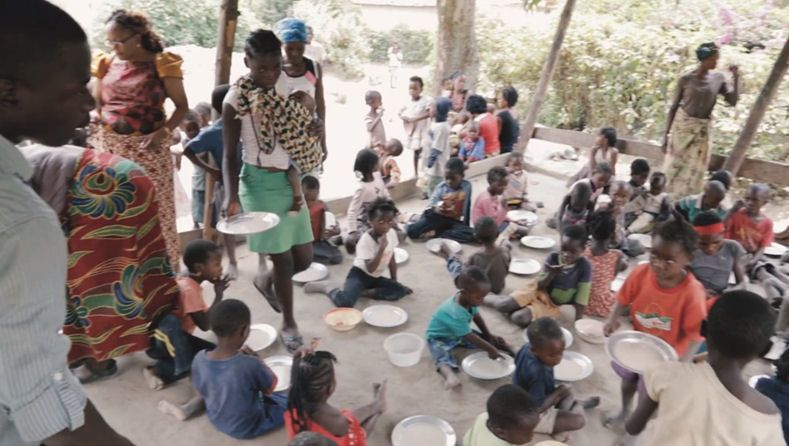

As well as a feeding program for 600 or so of the neediest children in the Kitwe and surrounding townships, they have two orphanages: The Grace Centre for boys at Nkana West and the Faith Centre for girls at Luangwa.
At the orphanages they are not just given food & clothing but are being cared for in a secure & loving family atmosphere and discipled as part of a faith-filled church. Some of the children at the orphanages are sponsored by individual people, churches and by organisations for their educational needs. Out of this the children now have growing aspirations to make the most of their lives.
The moto of ‘Dayspring Ministries’ for the children is; “REBUILDING CONFIDENCE” this is because most of the children have lost confidence due to the traumas that they have experienced in their young lives as well as coming from very impoverished families.
Most of the children who are on the streets and in the orphanages, have lost one or both of their parents to HIV and Aids.
In Zambia HIV and Aids has been an epidemic leaving children vulnerable and having to fend for themselves on the streets. Even if the children have grandparents this can still be the case, because their grandparents are usually in poor health themselves and don’t have the means to look after their grandchildren.
This situation can lead to some of the street children getting into things they shouldn’t, like sniffing glue and all sorts of other vices. The helpers involved in the Streetlife project go into the compounds in Kitwe and other areas to help those vulnerable children by setting up feeding stations.
Also, if there is a space in one or both of the orphanages they will rescue a child from the streets and that child will live at an orphanage but will be cared for in a secure & loving family atmosphere and hopefully they will receive a sponsor for their needs such as education.

The feeding programs and the orphanages all need funding to be able to continue and so there are various ways that this can be achieved.
One way is for an individual person or a church or organisation to sponsor a child at the orphanage through their education, including college.
Another way is to make a donation to ‘Dayspring Ministries’ to help provide funds so that they can continue helping the children on the streets.
For more information on the Streetlife project please watch this video clip by clicking on this link: Streetlife
Please note that as of 2018 the number of orphaned children now being cared for by Dayspring Ministries in their two orphanages is over 50 boys and girls of different ages. Also the number of children being fed and helped who live on the streets is now over 600 children. The cost of feeding the children has gone up considerably and so any help you can give to the Streetlife project would be gratefully received.
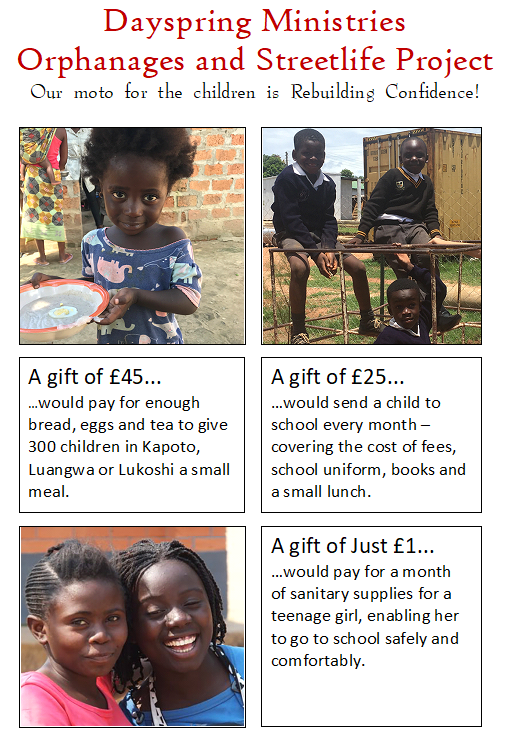
If you would like to help 'Dayspring Ministries' by sponsoring a child at one of the orphanages, then please contact: info@christcentralchurches.org
If you would like to help support the Streetlife project 'Dayspring Ministries' run by making a direct donation to the Streetlife project, then please contact: streetlifezambia.org/giving/
Thank you!
Updates & Events

This page covers the relevant events that we are hoping to hold during the year to raise money for the project, so please check this page from time to time for updates and new events, thank you.
Below is a list of events we hope to be putting on ourselves or an organisation is putting on but we will receive a donation from the proceeds of that event.
We would like to take this opportunity to thank the organisers of SOUNDS LIKE FUN for their generosity in making Bee Against poverty Zambia, one of the recipients of monies raised from this event.
Once again Dave & Phil on behalf of 'Bee Against Poverty Zambia' want to thank 'Sounds Like Fun' choir for their support of 'Bee Against Poverty Zambia' through their generous donation of £513 from the concert.
OUR NEXT EVENT IS A BEE AGAINST POVERTY ZAMBIA (BAPZ) CRAFT FAYRE ON 4th OCTOBER IN THE UNITED REFORMED CHURCH FORDINGBRIDGE
Please come along and support our Zambia project and you could pick up a bargain as well!
Thank you!
It was a quiet Craft Fayre, because we think people were still anxious about coming out and mingling with crowds of people. Having said that we still made over a £100 pounds from this event. Many thanks to the United Reformed Church for all their help in hosting this BAPZ Craft Fayre and to everyone who attended and bought something.
OUR NEXT EVENT IS A CRAFT FAYRE ON 2nd DECEMBER IN THE UNITED REFORMED CHURCH FORDINGBRIDGE
TYING IN WITH LATE NIGHT SHOPPING IN FORDINGBRIDGE
This Craft Fayre started slow it picked up and we saw people come through the doors in waves but we did have some quiet periods as well. But as we hadn't organised it on behalf of Bee Against Poverty Zambia, this time we only had a table, we still made £50 at the end of the evening. We will also be one of 3 organisations that will receive a donation from the United Reformed Church from the proceeds of this event. Once again we want to thank whole heartedly the United Reformed Church for hosting this event and for the forthcoming donation. Also we would like to thank all the people who came and bought items at the Fayre.
OUR NEXT EVENT IS A QUIZ NIGHT
We are hosting a QUIZ NIGHT on the 10th May in the United Reformed Church Fordingbridge, please see poster attached for information.
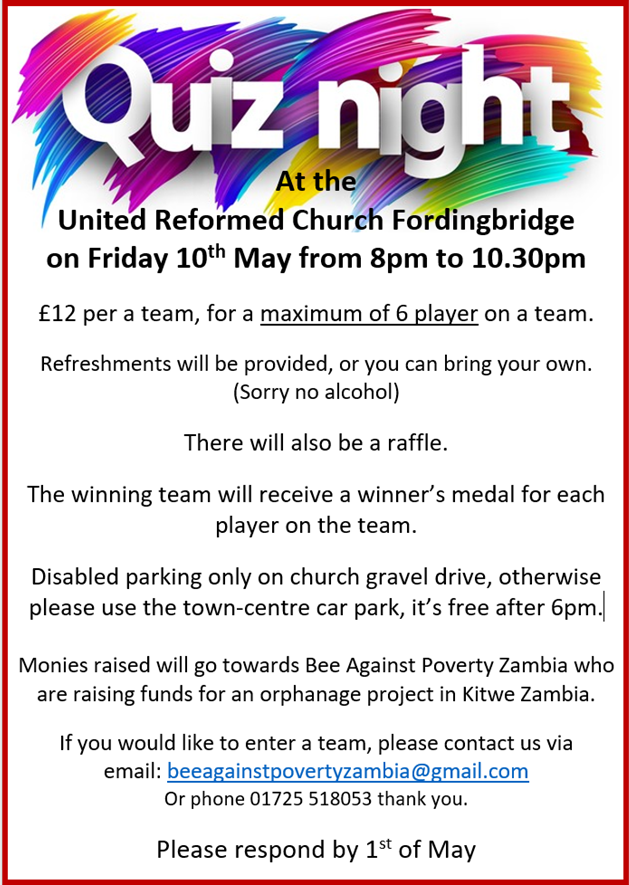
OUR NEXT EVENT IS A TABLETOP SALE
We are hosting a Tabletop sale on 18th of May in the United Reformed Church Fordingbridge, if your wanting to secure a table you should contact us before 27th April, for further information please see poster attached.
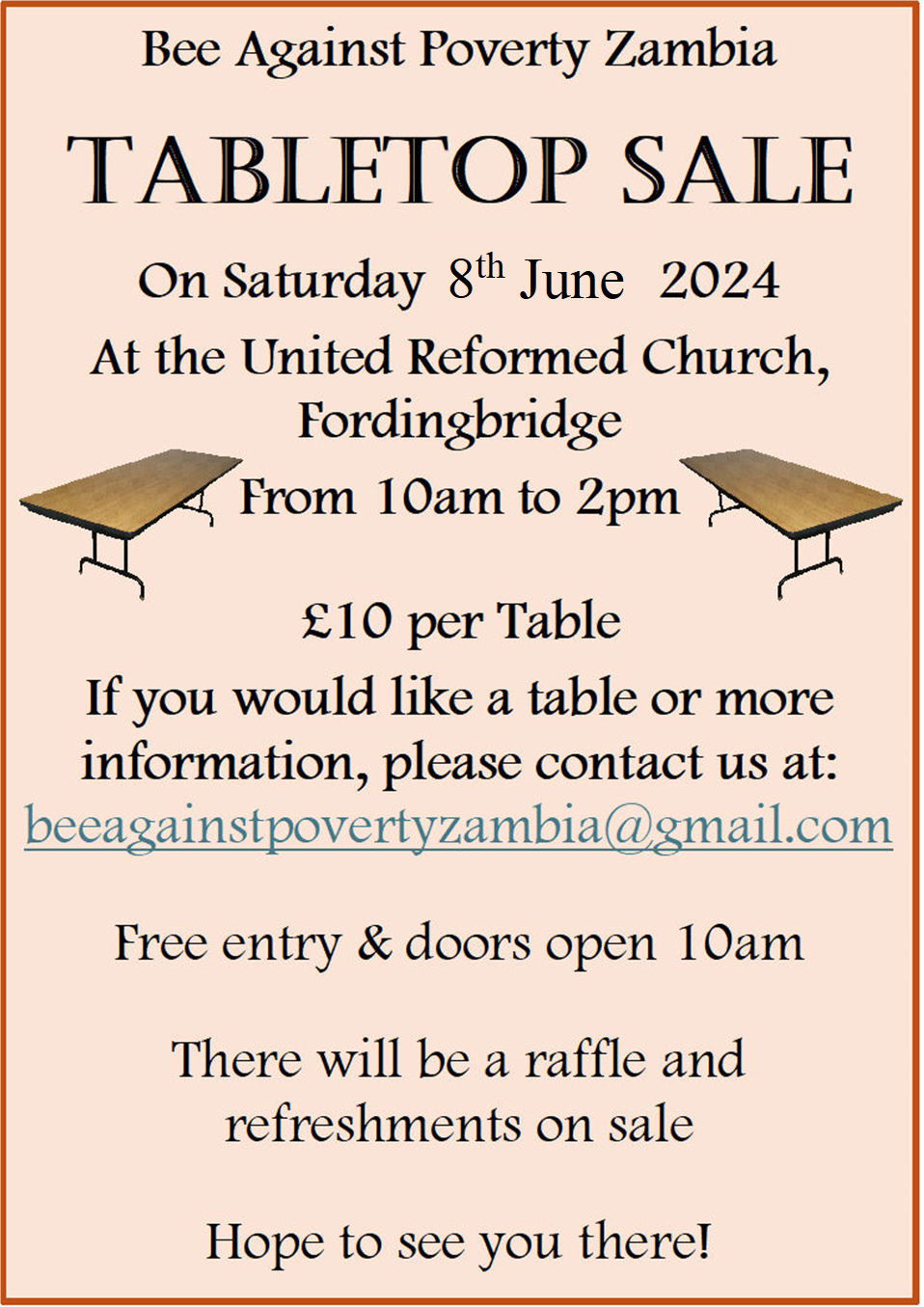
Thank you.
OUR VISIT TO KITWE IN ZAMBIA AND THE GIRLS ORPHANAGE
(A video link will be ready in a while which will show our visit to Kitwe in Zambia and how we got on installing an Arger type fire and showing Goodson how to use the honeycomb press, Goodson has kindly agreed to take on the overseeing of the project in Kitwe for us and will spearhead it there.)
Contact Us
- Hampshire, England, UK

